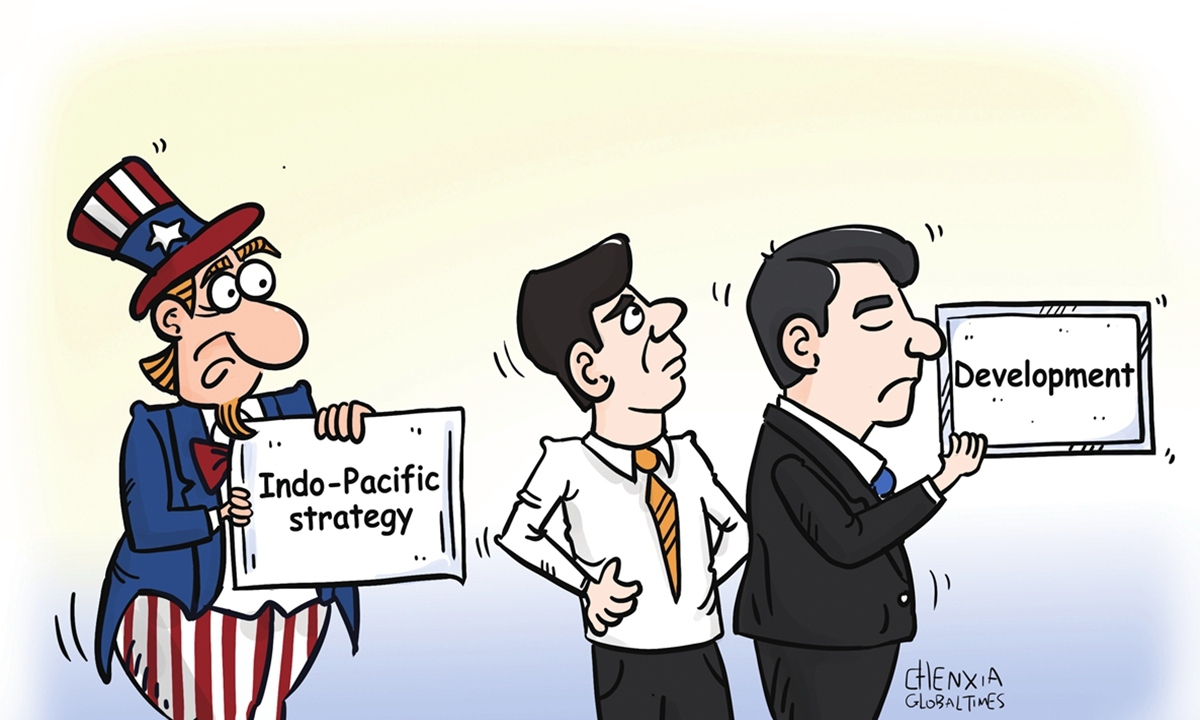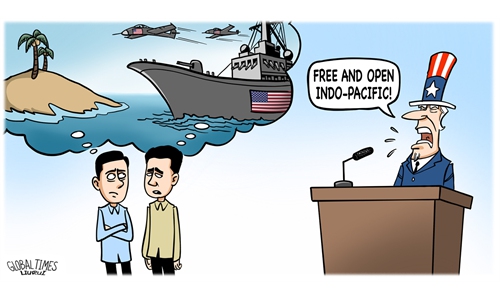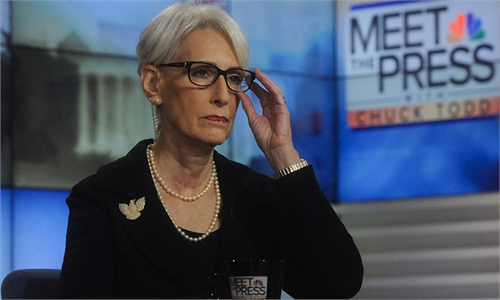Let’s hope US diplomacy doesn’t end up as chewing gum on the bottom of China’s shoes: Global Times editorial

Illustration: Chen Xia/Global Times
At the invitation of Chinese President Xi Jinping, Indonesian President Joko Widodo is visiting China from July 25 to 26. Widodo is the first foreign head of state to visit China after the Beijing Winter Olympics, and China is also the first stop of Widodo's first East Asia trip since the COVID-19 epidemic, which fully reflects the great importance that China and Indonesia attach to their relations. The visit is bound to further deepen strategic mutual trust and practical cooperation between the two sides.
Indonesia, an important neighbor of China, is the largest and most populous country in ASEAN and the opportunities brought by economic globalization are significant for the country's development. There is great common interest and room for cooperation between China and Indonesia. A typical example is that Chinese enterprises have invested in nickel mines in Indonesia, making it a global stainless steel producer by leaps and bounds, while Chinese enterprises have also received a good return on their investment. This cooperation between China and Indonesia has brought tangible benefits to both countries and peoples.
It is therefore not hard to understand why the trade between the two countries is growing despite the pandemic: bilateral trade volume exceeded $120 billion in 2021, up 58.6 percent year-on-year, the highest increase among ASEAN countries. China has been Indonesia's largest trading partner for nine consecutive years. Significant progress has been made in the "Belt and Road" landmark projects, such as the Jakarta-Bandung high-speed railway (HSR), the Regional Comprehensive Economic Corridor, and the "Two Countries, Twin Parks." China-Indonesia relations have been heating up in recent years, not driven by geopolitics but by the inherent development dynamics and needs of both sides.
We noticed that the timing of the rhetoric of Mark Milley, chairman of the US Joint Chiefs of Staff, about China being "aggressive" in Indonesia, just a day before Widodo departed for his visit to China, is clearly not a coincidence. In a bluntly provocative meeting with Indonesian military officials on Sunday, Milley said he wanted to cooperate with the Indonesian military to "meet whatever challenge China poses." He also claimed that the Chinese military has become significantly more aggressive and dangerous over the past five years.
Milley's purpose is too obvious, which undoubtedly is to provoke the relationship between China and Indonesia and to spoil the atmosphere of President Widodo's visit to China. But such malice toward China is equally extremely disrespectful to Indonesia. It denies Jakarta's pragmatic approach to China, and even its independent and autonomous diplomatic capabilities. Milley is close to directly telling Indonesia: "China is bad, don't play with it." But won't Indonesia itself be able to distinguish between good and bad? At the Shangri-La Dialogue last month, Indonesian Defense Minister Prabowo Subianto had just urged countries to respect China's "rightful rise back to its position as a great civilization."
In fact, such "coincidences" do not take place only in Indonesia. In recent years, many major diplomatic activities initiated or advocated by China have become targets for the US to sabotage and undermine. For example, seeing that the relations between China and the South Pacific island countries are developing well, Washington immediately re-recognized the "special value" of the South Pacific island countries as if it had discovered a new continent. When China and African countries jointly proposed the establishment of the Forum on China-Africa Cooperation, Washington cast covetous eyes at it and is now set to hold a US-Africa summit. In terms of the China-proposed Belt and Road Initiative (BRI), which is in full swing, Washington is acting as if it encountered a big enemy, and has launched several alternative plans, in a bid to replace the BRI.
Today, in the name of providing regional countries with "an alternative to China," the US is actually attempting to weaken or sever their already close ties with China in a forceful manner, undermining regional peace and stability. For the US, this is not only disgraceful, but also a dangerous degradation of national power. Once US diplomacy has been reduced to a piece of chewing gum stuck to the sole of China's diplomatic shoes, where will one be able to see the "global leadership" that the US has always been proud of? While paying close attention to China, the US has gradually lost itself, and then lost its vision, mind and creativity as a major country.
Recently, some US and Western public opinion forums have been playing up the"China-US rivalry in Southeast Asia"concept, which is a completely false proposition imagined by Washington. The common development between China and Southeast Asian countries has a broad vision of development, and it is not aimed at "driving the US out of the Pacific Ocean." Washington's "coercive diplomacy" is getting increasingly ineffective. The Asia-Pacific is a land of growth and its waters have traditionally been the home of busy merchant fleets, thus few people here want to see an atmosphere of conflict created by US aircraft and warships looming on the Pacific region.
In contrast to Washington's rhetoric, China's cooperation with Southeast Asian countries is real. The roads paved and bridges built are visible and tangible to ordinary people. The Jakarta-Bandung high-speed railway in Indonesia has entered the track laying stage. This is China's first HSR project with a full industrial chain to be exported abroad, and it is also the first HSR in Southeast Asia with a speed of 350 kilometers per hour. It is believed that the existence of this railway will certainly outlive Washington's "China threat" campaign.



